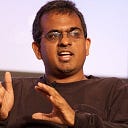Member-only story
Is the ‘Mandela Effect’ Science, Science Fiction, or Mass Delusion?
What some dismiss as misremembering could be a hint of alternate realities
 If you follow unusual theories online, you’ve probably heard of the Mandela Effect. It’s a phenomenon in which a large group of people remembers a different history than that which we “know” to be true. I put “know” in quotes because of the underlying questions that the Mandela Effect raises about the nature of reality, memory, and timelines.
If you follow unusual theories online, you’ve probably heard of the Mandela Effect. It’s a phenomenon in which a large group of people remembers a different history than that which we “know” to be true. I put “know” in quotes because of the underlying questions that the Mandela Effect raises about the nature of reality, memory, and timelines.
The term was coined by blogger Fiona Broome in 2009, after hearing many stories of people who “remembered” Nelson Mandela dying in prison in the 1980s. A quick internet search will tell you that Mandela won the Nobel Peace Prize in 1993, went on to become the first President of South Africa after apartheid ended in 1994, and died in 2013. At least in our timeline.
The Mandela Effect wouldn’t be a big deal except that it seems large numbers of people have the “other memory” — it’s as if there was a separate timeline that they recall, but now are all stuck on “our” timeline. Is this possible? Or are they all simply misremembering the same thing?
Popular in Science Fiction
Though it was named only recently, throughout history there have been countless examples of this phenomenon. The possible explanations put forth have ranged from mass delusions, to false memories to parallel worlds, and my personal favorite, the simulation hypothesis. If these explanations sound like science fiction, it’s because the idea of multiple timelines converging and diverging (usually because of a time traveler or two) has become a common trope in science fiction.
In every good time travel story, someone goes back in time and attempts to change something. Whether that person is the villain (as in the show Timeless) or the hero (as in Dr. Who) is up for interpretation. In almost every case, though, changing the past ends up changing something in the present. Hopefully for the better, but sometimes for the worse. The people who went back in time usually remember what the timeline was like beforehand, but everyone else does not. They only know the new reality, blissfully unaware that something has “changed.” When it’s Dr. Who and his…

